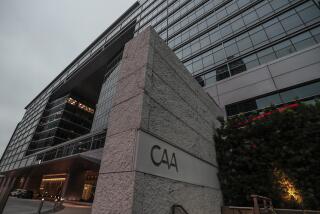The Cutting Edge: Computing / Technology / Innovation : 3 Baby Bells, CAA Planning Joint Venture : Media: Hollywood agency and the phone firms will develop technology and programming for video networks, sources say.
- Share via
In a major challenge to the cable television industry, three regional phone companies and Hollywood’s powerful Creative Artists Agency plan next week to unveil a joint venture to develop technology and programming for a new generation of video networks they are building.
The venture, which will be equally owned by phone operators Bell Atlantic, Nynex and Pacific Telesis, will buy and produce programming in addition to offering services such as movies-on-demand and home shopping systems, knowledgeable sources said.
CAA, which is barred from owning major stakes in programming because of Hollywood guild agreements, is serving as a strategic consultant to the partners. It will advise them in areas such as programming and the development of a “navigation” system that will help users sort through myriad program options.
The venture--two years in development but still unnamed--appears to be the biggest gambit yet among the regional phone companies to help spur the development of the so-called information highway that is expected to offer countless entertainment and information services over telephone and cable TV lines.
“You are just beginning to see the kind of relationships needed to get these (interactive) services to consumers,” said Jerry Held, senior vice president of interactive multimedia at the software firm Oracle in Northern California, pointing to the high cost of developing content for the new interactive systems.
But the plans could still be stymied by regulatory hurdles and a lack of technical standards among the partners. Moreover, widespread distribution of the service will depend on how fast the Baby Bells can upgrade their telephone lines to fiber-optic, a process that will take them well into the next decade.
The initial capital outlay is expected to be modest. The three Baby Bells will spend $450 million over the next three years developing and rolling out the system, which is expected to reach about 30 million customers. The final total investment, however, could be considerably higher. Eventually the Baby Bells may try to sell the service to other phone companies outside their service areas, the sources said.
In order to clear certain regulatory hurdles, as well as to promote industrywide standards, the partners are establishing two separate entities--a media company to develop and produce programming, and a technical company to integrate the technology and develop the computer software necessary to power the system. The media venture will be based in Los Angeles and New York, and the technical company will have offices in San Francisco and Reston, Va.
The joint venture brings together three Baby Bells covering six of the top 10 markets in the country--New York, Los Angeles, Philadelphia, Boston, San Francisco and Washington-Baltimore. The biggest market not covered by the partners is Chicago, where Ameritech is based. Ameritech is said to be pursuing its own discussions for a video/information service with Walt Disney Co., although sources did not rule out its eventually joining the other Baby Bells.
As envisioned, the service would eventually provide regional as well as national programming. It would begin rolling out in some markets in late 1995 most other markets by 1996, sources said.
The creation of a media company appears to be an effort to work around regulations that prohibit Bell companies from offering programming over their networks. Under the proposed arrangement, the joint venture will finance the cost of creating new programming services in anticipation of those regulations’ being eased.
Bell Atlantic, the only Baby Bell currently cleared by the courts to offer video programming, already has programming trials under way in northern Virgina.
In addition to the media company, the consortium will establish a company to work on common standards for delivering programs and billing customers. The goal of the company is to share the high cost of development and drive down expenses. Analysts estimate the current cost of delivering video-on-demand as high as $3,000 a customer.
Bell Atlantic has 300 employees in Reston working on video technology. The company also has a navigation program called Stargazer. It is unclear whether those operations and software will be merged into the new technology company.
One mandate of the technology company will be to develop a Stargazer-like navigator that will help customers make their way through the various program offerings to find the movie or shopping service they want. CAA will advise the technology company on the look and feel of the navigator--a crucial element in helping perplexed viewers scroll through the assortment of programming and information options.
More to Read
The biggest entertainment stories
Get our big stories about Hollywood, film, television, music, arts, culture and more right in your inbox as soon as they publish.
You may occasionally receive promotional content from the Los Angeles Times.









